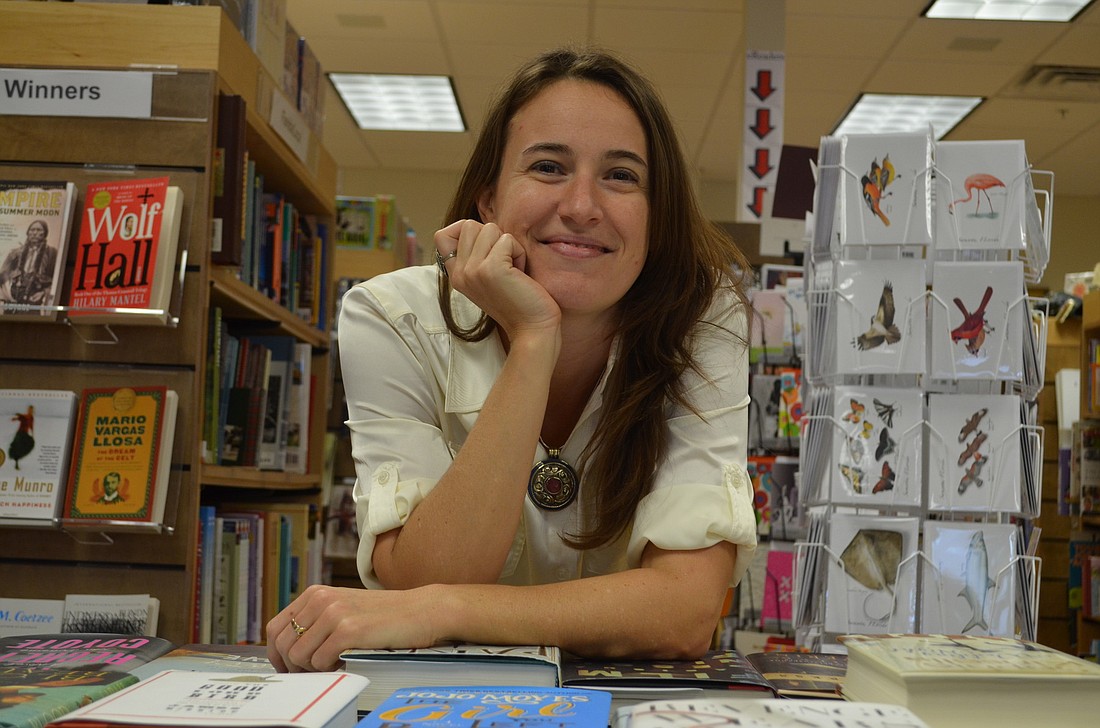- April 25, 2024
-
-
Loading

Loading

Writer Alexis Orgera suffers from migraines. She calls them ragers. Ragers make her vomit violently for 12 hours.
As a teen, Orgera got ragers once a week; as a 36-year-old adult she gets them as infrequently as twice a year. She did a lot of research on her ragers for her novel “You Don’t Mind: Neurojourney.” The book explores her brain’s foibles paralleled with her father’s, Bo Orgera’s, struggle and eventual death from Alzheimer’s Disease. It was in doing this research that she realized her migraines are stress related.
Go figure, when she quit her job to pursue writing in fall 2011, she got lots of ragers. She was teaching composition and creative writing at her alma mater, New College. It was terrifying to quit — even if her motive of producing literature was worth the uncertainty involved in trying to support herself on words alone.
Her pursuit was to achieve truth.
She says once she delved into the cause of her ragers, she didn’t have as many — despite the fact that she went through a stressful time experiencing the slow death of her father from Alzheimer’s.
Her most recent work, “You Don’t Mind” explores that period of her life, from the joy of spending time with him to the heartache of losing him to the disease, little by little.
“I make art because it’s an expression of my life experience,” she says.
Orgera is soft-spoken. She sits relaxed in the backroom reading nook of Bookstore1Sarasota, where you can occasionally find her working the front desk. She’s also the coordinator of PoetryLife, Sarasota’s annual celebration of poetry and poetry education. If you’re seeking poetry, Orgera can pull the perfect book for you from the shelves of thousands — she’ll know exactly where it is.
What you probably wouldn’t find out is that her first book of poetry “How Like Foreign Objects” is proudly propped on the front display — unless one of her co-workers tries to hawk it to you and you somehow noticed her name on the front cover. She’s too shy to sell it herself.
Poetry is in Orgera’s nature. Her second book of poetry “Dust Jacket” comes out in December. “You Don’t Mind,” which is in the editing process, is her first foray into autobiographical narrative. The work of literature won her this year’s The Arts and Cultural Alliance of Sarasota County’s John Ringling Towers Fund Award.
Orgera moved back to Sarasota when her father got sick nearly a decade ago. Her father was 52 years old, and Orgera was living in California at the time.
“My mom called me saying, ‘Something’s wrong with your dad. He’s sleeping all the time and forgetting really basic things,’” Orgera explains.
A year after that conversation, Orgera decided she needed to move back home. Orgera didn’t start writing the book until her father got progressively worse. It follows his final years up until he was admitted into a nursing home. He died in August at age 60.
Some people, referring to that pejorative group of writers who think there are unbreakable rules to writing, would say not to write a book while you’re going through the experience about which you’re writing.
“But I couldn’t not!” Orgera says. “I think I needed to get through the experience, and I didn’t know how to do it without writing.”
She wrote about the afternoons she and her father spent painting together. They’d listen to “Mellow Yellow” by Donovan or “Crimson and Clover” by Tommy James and The Shondells. These are the same songs that Orgera remembers listening to before her dad got sick. Her favorite memories were driving and listening old ’60s songs; he would tell her about the first time he heard them.
She wrote about when they had to stop painting because her father couldn’t hold a paintbrush or hold his attention — he forgot the movements.
“It can be really difficult to read in terms of emotional intensity,” she says of her book.
It’s written in a lyric essay form meant to reflect what’s taking place in her mind as it’s happening. This means it’s not always linear. Some essays are one page long. Others are 20 pages long. They all connect and speak to each other. She hopes in some ways other people dealing with similar life experiences can feel a kinship.
“There could be a sense of comfort,” she says. “Or repulsion.”
The book gets progressively more difficult to read as her father gets progressively worse. She talks about him urinating on the kitchen floor and wiping feces on the bathroom’s light switch.
“It’s ugly,” she says.
But, it’s honest. It honestly portrays the peaceful times they spent together, too. It taught her a lot about Alzheimer’s more so than her father. She had to do a lot of research for the book. In fact, the title comes from Dr. Alzheimer’s documentation of one of his earliest patients dealing with Alzheimer’s. Her essays are sprinkled with research on migraines and Alzheimer’s. She hasn’t had as many ragers since exploring her own brain’s functions.
But, this process was therapy in more ways that that. She can, and appears ready to talk about her father today without getting emotional.
“I couldn’t help but face it because I was there in the process,” she says of not hiding from grief. “It forced me to integrate grief into my life as we went.”
